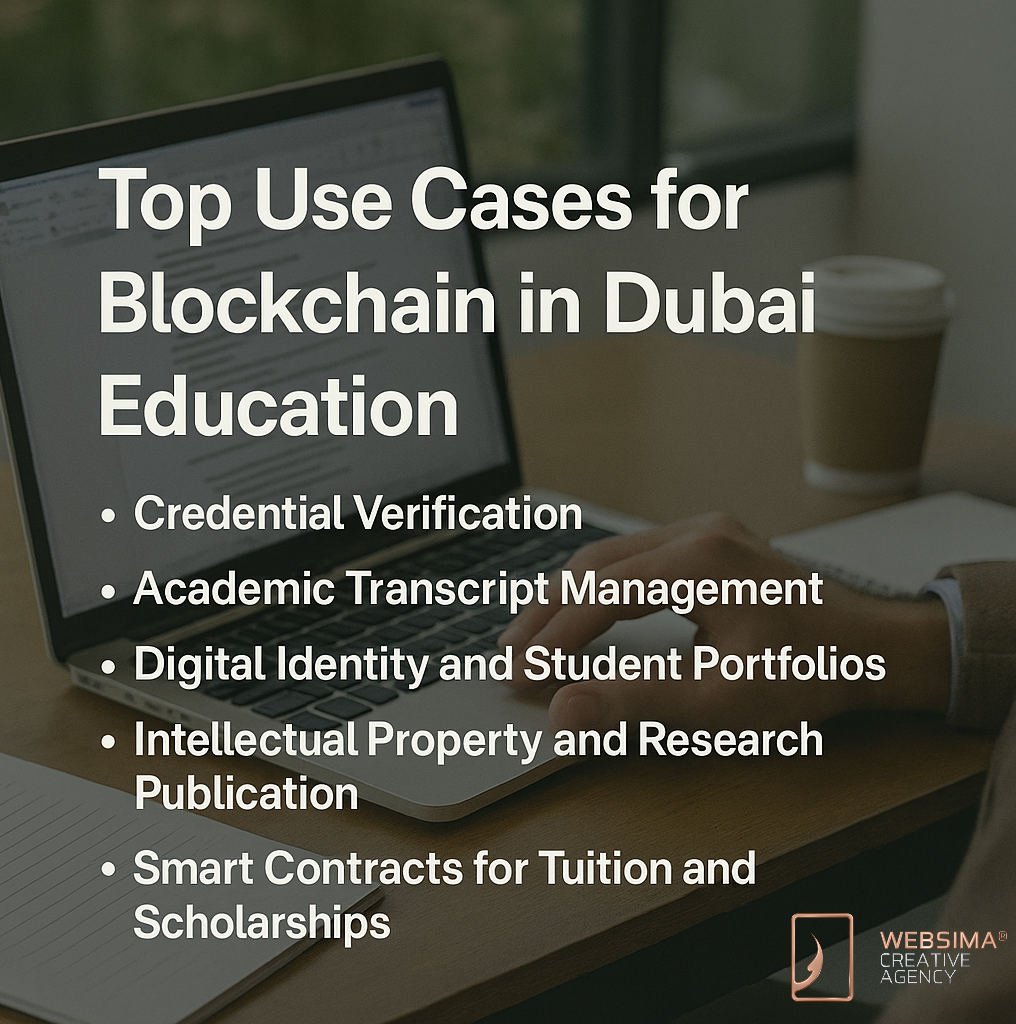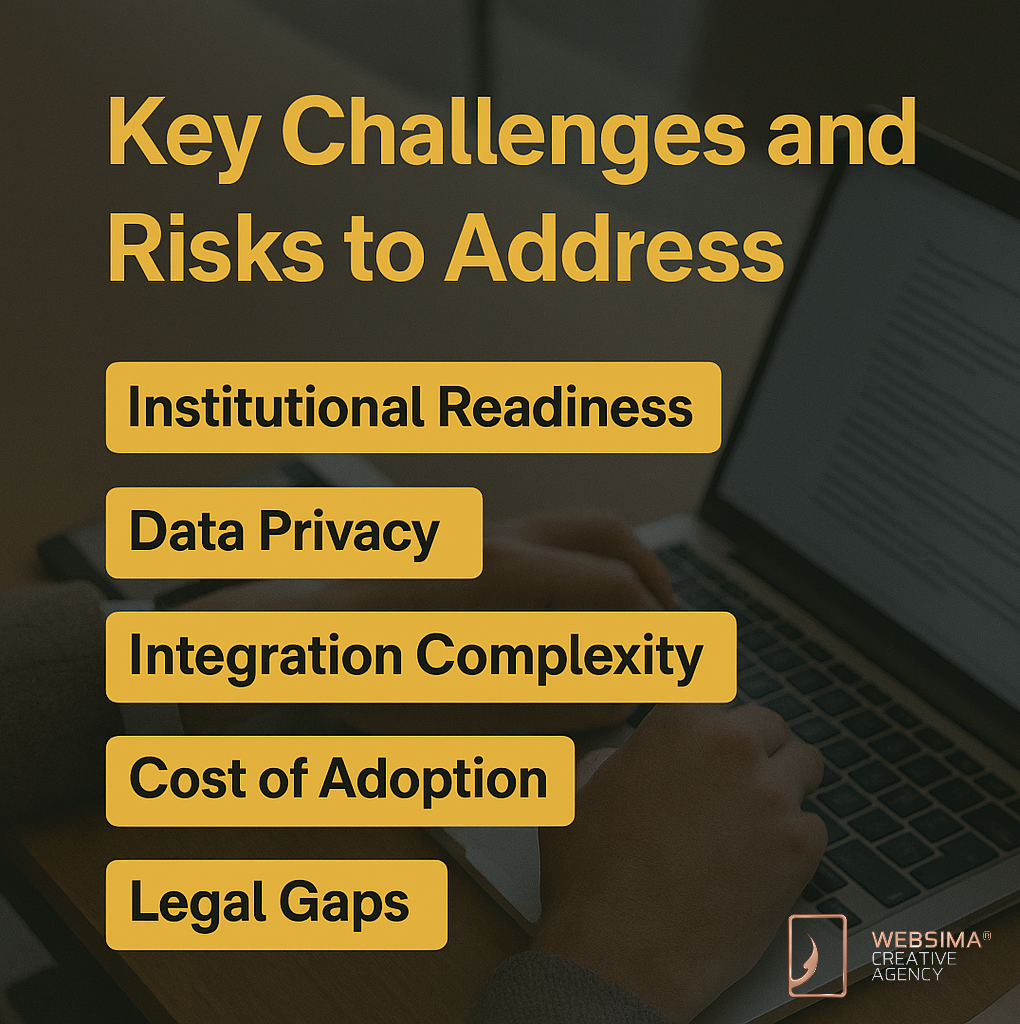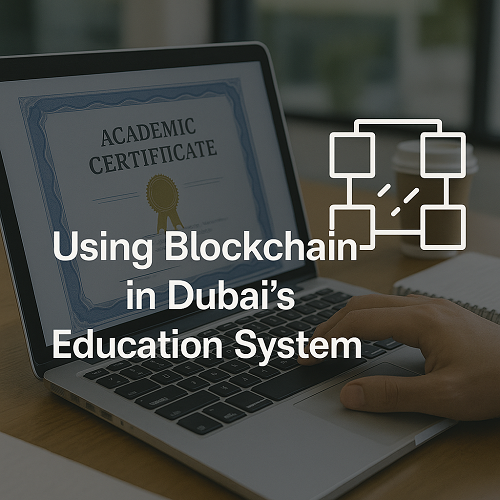Table of Contents
- Introduction: Why Blockchain Matters in Education
- Dubai’s Vision for Blockchain in the Education Sector
- Top Use Cases for Blockchain in Dubai Education
- Credential Verification
- Academic Transcript Management
- Digital Identity and Student Portfolios
- Intellectual Property and Research Publication
- Smart Contracts for Tuition and Scholarships
- Benefits of Blockchain Integration in Education
- Key Challenges and Risks to Address
- Global Benchmarks: Blockchain in Education Around the World
- Dubai Case Study: Blockchain-Powered Credentialing by KHDA
- Technology Stack for Educational Blockchain Solutions
- Legal and Regulatory Considerations in UAE
- FAQs About Blockchain in Dubai Education
- Conclusion
- Partner with Websima for Educational Blockchain Development
Introduction: Why Blockchain Matters in Education
As education becomes increasingly digitized, new challenges arise around record management, credential fraud, student privacy, and institutional transparency. Blockchain offers a powerful solution to these problems by introducing decentralized, immutable, and verifiable data management.
Dubai, as a global smart city leader, is exploring ways to embed blockchain in public and private education systems. From academic records and attendance to research certification and digital student portfolios, the applications of blockchain in Dubai education are vast and transformative.
Dubai to Accept Crypto for Government Payments
At the Dubai Fintech Summit, the Department of Finance announced a game-changing move — it will now accept cryptocurrencies for government fees through a new MoU with https://t.co/ekEiBkRHYh.
Major step in digital… pic.twitter.com/foGfsJ5pM4
— Junaid Dar (@JunaidDar85) May 13, 2025
That’s why the future of blockchain and Web3 in UAE and Dubai seems to be bright and exciting.
Dubai’s Vision for Blockchain in the Education Sector
Under the Dubai Blockchain Strategy, launched by Digital Dubai and the Dubai Future Foundation, the emirate aims to process 50% of government transactions using blockchain.
This includes the education sector, where entities like the Knowledge and Human Development Authority (KHDA) and the UAE Ministry of Education are beginning to roll out blockchain-based credentials and student verification systems. Using blockchain in education, by considering potentials, can be one of the top blockchain business ideas for entrepreneurs in Dubai and UAE.
Dubai’s educational blockchain roadmap aligns with broader national goals like:
- UAE Centennial 2071
- Vision 2030
- The UAE Blockchain Strategy 2021
These frameworks promote secure, tech-integrated government services across healthcare, real estate, and education.
Top Use Cases for Blockchain in Dubai Education

Credential Verification
One of the most immediate applications of blockchain in Dubai education is secure credential issuance. Students can receive blockchain-verified degrees and certificates, which employers or other institutions can verify instantly—eliminating the need for manual validation.
This drastically reduces diploma fraud and saves time during admissions or job screenings.
Academic Transcript Management
Students often need to share transcripts for transfers, job applications, or further studies. A blockchain-based transcript can be updated in real-time, ensuring data integrity and instant accessibility. Schools can also automate credit transfers and maintain permanent, tamper-proof academic histories.
Digital Identity and Student Portfolios
Blockchain enables self-sovereign identity solutions where students manage their learning history through decentralized IDs. These IDs can store:
- Academic results
- Extracurricular activities
- Skills certifications
- Attendance records
- Volunteer contributions
Such portfolios promote lifelong learning and student autonomy.
Intellectual Property and Research Publication
Dubai is home to many research universities and innovation hubs. Blockchain can timestamp and immutably store research, ensuring authorship, preventing plagiarism, and enabling transparent peer review.
Smart Contracts for Tuition and Scholarships
Educational institutions in Dubai can utilize smart contracts to automate:
- Tuition installment plans
- Scholarship disbursement based on eligibility
- Refund clauses tied to attendance or academic performance
This streamlines financial operations and improves accountability.
Benefits of Blockchain Integration in Education
| Benefit | Description |
| Enhanced Transparency | Every transaction is visible and traceable by authorized parties |
| Tamper-Proof Records | Credentials and transcripts cannot be altered or faked |
| Student Ownership | Learners control their data and decide what to share |
| Cost and Time Savings | Automates manual verification and administrative tasks |
| Interoperability | Enables easy migration of student data between institutions or countries |
| Global Trust | Institutions using blockchain can attract international students and staff |
For Dubai, these benefits also support its ambition to be a global knowledge economy and top smart education hub.
Key Challenges and Risks to Address
Despite the promise of blockchain in Dubai education, several challenges remain:

- Institutional Readiness: Many schools and universities lack the technical capacity or training to adopt blockchain platforms.
- Data Privacy: While blockchain ensures immutability, it raises questions about storing sensitive student data—especially involving minors.
- Integration Complexity: Merging blockchain with existing Learning Management Systems (LMS) or ERP solutions requires interoperability standards.
- Cost of Adoption: Smaller institutions may face cost barriers for infrastructure and development.
- Legal Gaps: International credential recognition via blockchain still lacks standardized legal frameworks.
These issues can be addressed through pilot programs, public-private partnerships, and gradual integration strategies supported by UAE’s edtech ecosystem.
Global Benchmarks: Blockchain in Education Around the World
Dubai’s progress in blockchain adoption mirrors innovations from other countries:
- Malta has implemented national blockchain credentials for all state institutions.
- Singapore uses OpenCerts for issuing diplomas via blockchain.
- India’s National Academic Depository integrates blockchain to issue skill development certificates.
- MIT and the University of Nicosia offer digital diplomas secured on blockchain.
- The Netherlands, through SURFnet, developed digital diploma pilots for university graduates.
These case studies show that blockchain can support cross-border education standards, mobility, and trust.
Dubai Case Study: Blockchain-Powered Credentialing by KHDA
The KHDA, Dubai’s regulatory authority for education, partnered with Smart Dubai to issue blockchain-based degree attestations and academic records.
Key features of the KHDA blockchain platform:
- Digital certificates with QR-code validation
- Instant verification for employers and embassies
- Automated school transfer and attestation workflows
- Blockchain storage of credentials for lifelong access
This initiative demonstrates how blockchain in Dubai education is already being deployed at scale, creating measurable improvements in service delivery and trust.
Technology Stack for Educational Blockchain Solutions
| Component | Technology Examples |
| Blockchain Layer | Ethereum, Polygon, Hyperledger Fabric |
| Credential Tools | Blockcerts, OpenCerts |
| Smart Contracts | Solidity, Vyper, DAML |
| Identity Layer | uPort, Civic, Sovrin |
| Storage Layer | IPFS, Arweave, Filecoin |
| Frontend | React, Next.js, Tailwind CSS |
| Integration | RESTful APIs, GraphQL, OAuth, SCORM |
At Websima, we help academic institutions build fully integrated blockchain education platforms that align with Dubai’s digital vision.
Legal and Regulatory Considerations in UAE
Blockchain solutions in education must comply with:
- UAE Data Protection Law (Law No. 45 of 2021)
- KHDA digital record guidelines
- VARA regulations, if using tokenized mechanisms (e.g., crypto-tuition)
- Dubai Electronic Transactions Law for digital identity and signatures
Our legal tech team ensures all educational DApps and systems we build are aligned with current UAE compliance standards and privacy best practices.
FAQs About Blockchain in Dubai Education
Can blockchain be used in K–12 schools?
Yes. It’s useful for attendance tracking, assignment submission logs, and parent-teacher communications.
Does KHDA officially support blockchain?
Yes. KHDA has issued blockchain-based degree verifications and continues expanding its digital services.
Can students carry their blockchain credentials internationally?
Yes. With platforms like Blockcerts, students can apply globally using verified digital credentials.
Is storing academic records on blockchain secure?
Yes, if sensitive data is stored off-chain (e.g., IPFS) and only hashes are stored on-chain.
What are the costs for an institution to adopt blockchain?
Costs vary depending on the scale and customization, but many Websima clients opt for phased pilot deployments to control budget and evaluate ROI.
Conclusion
The use of blockchain in Dubai education is no longer theoretical—it’s happening now. With KHDA’s successful implementation, global best practices to draw from, and a forward-thinking regulatory environment, Dubai is set to become a world leader in educational blockchain innovation.
Blockchain’s ability to secure credentials, empower students, reduce fraud, and enable cross-border interoperability aligns perfectly with Dubai’s digital-first education agenda.
However, implementation must be guided by technical planning, legal compliance, and stakeholder collaboration. Schools, universities, and vocational centers must work with experienced blockchain partners to ensure scalable, secure, and compliant systems.
Partner with Websima for Educational Blockchain Development
At Websima, we provide end-to-end solutions for implementing blockchain in Dubai education—from ideation and architecture to smart contract development, user interfaces, and regulatory compliance.
Whether you’re looking to:
- Issue blockchain diplomas
- Create student credential wallets
- Build a digital ID system
- Automate scholarship disbursement
- Ensure KHDA/MOE/VARA compliance
We’re here to help.
Contact Websima today to discuss how blockchain can transform your educational institution. Let’s build a smarter, more secure future for learning in the UAE.





